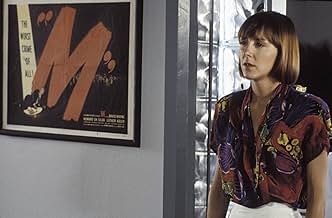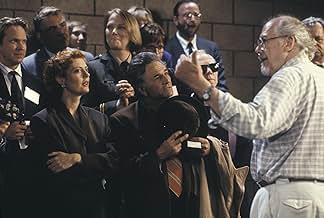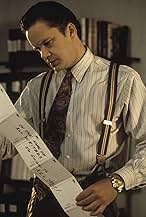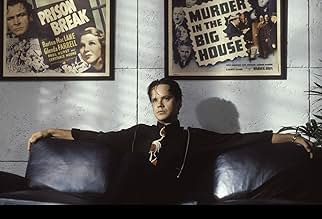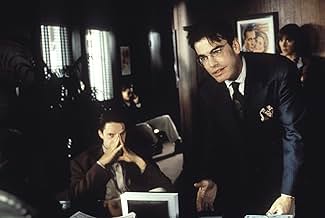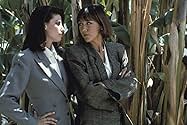Um executivo de um estúdio de Hollywood recebe ameaças de morte de um escritor que ele rejeitou, mas qual?Um executivo de um estúdio de Hollywood recebe ameaças de morte de um escritor que ele rejeitou, mas qual?Um executivo de um estúdio de Hollywood recebe ameaças de morte de um escritor que ele rejeitou, mas qual?
- Indicado a 3 Oscars
- 24 vitórias e 33 indicações no total
Avaliações em destaque
'The Player (1992)' is a meta and witty inside-joke, jabbing at the ribs of tinsel-town in a cynical yet comedic way, and it manages to sardonically satirise the entire studio system, with a only little bit of self-aggrandising and perhaps an equal measure of self-deprecating. The picture isn't particularly funny, though it can cause some chuckles, but is instead the kind of sly smile inducing mockery that takes its time to dawn on you and isn't immediately obvious. It's this undercurrent that carries the flick much more than the main plot itself, so much so that the actual narrative becomes a part of the running gag as opposed to a vehicle for the individual jokes to spawn from. It's a unique, and somewhat acquired taste of a, film that's usually enjoyable and equally intelligent. 7/10
I am surprised that the IMDb trivia section is so short for this film. After all, it's jammed full of references to earlier films and is full of actor cameos. Because of this, it's clearly a film that bears re- watching in order to catch the many small details many would often miss. Also, because this film is ultra-famous, already has many reviews and is beloved by many, I'll keep my review relatively short. Suffice to say that it's a film lovers and insiders dream movie.
The film begins with an insanely difficult scene that sets the stage for the film. It's all in one long take where the camera moves all over a wide area on a film studio lot. But instead of being intimate, it feels almost like the viewer is hiding and peering at the many different things occurring simultaneously. This is brilliant, as the film does have a real voyeuristic quality...with many shots that are not traditionally framed but are as if you are watching in the near distance.
What follows is a very dark anti-fairy tale set in modern Hollywood. Instead of the usual story of a person working hard and doing good and ultimately being rewarded, this is pretty much the opposite. With a total jerk-face (Tim Robbins) screwing people over and even killing someone...and the consequences of this. It's obviously meant as an attack on many Hollywood types--the users, the superficial and the vaguely talented. Overall, a superb film that works very well due to wonderful direction and a black hole-dark script filled with cynicism.
The film begins with an insanely difficult scene that sets the stage for the film. It's all in one long take where the camera moves all over a wide area on a film studio lot. But instead of being intimate, it feels almost like the viewer is hiding and peering at the many different things occurring simultaneously. This is brilliant, as the film does have a real voyeuristic quality...with many shots that are not traditionally framed but are as if you are watching in the near distance.
What follows is a very dark anti-fairy tale set in modern Hollywood. Instead of the usual story of a person working hard and doing good and ultimately being rewarded, this is pretty much the opposite. With a total jerk-face (Tim Robbins) screwing people over and even killing someone...and the consequences of this. It's obviously meant as an attack on many Hollywood types--the users, the superficial and the vaguely talented. Overall, a superb film that works very well due to wonderful direction and a black hole-dark script filled with cynicism.
Griffin Mill (Tim Robbins) is a studio executive who listens to about fifty thousand pitches for films a year, but can only green light twelve, and even then he doesn't get the final say on whether or not a movie gets made. So not being a nice guy to begin with, he figures he's probably made enemies of quite a few people who never got past the gate that he keeps. Then he starts getting threatening letters on his windshield, delivered at the studio, etc. From a writer angry that he said he'd call him about his idea and never did. Mill decides that the angry writer must be David Kahane, and so one night he goes to a movie theater where Kahane is watching "Bicycle Thieves", they talk, then they go get drinks at a restaurant, but then Kahane starts angrily mocking him on the way to their cars and Mill beats him to death in a fit of rage. Stunned at what he did, Mill tries to make it look like a robbery and then leaves.
But this is not a noir - Mill doesn't panic or lie. When the police question him he admits that he met Kahane, admits their relationship, admits everything except the murder. The police suspect him from the start but he doesn't let their harassment get to him. On top of that the harassing letters continue - he killed the wrong writer.
I thought this film was hilarious. It is just so other-worldly with people having very odd reactions, almost like a David Lynch film, so that at times I think Mill is just daydreaming. But, no, these people really did say or do these weird things. And then there are all of the celebrities who are sometimes playing themselves and sometimes are playing a character in the film. And if you want to know why Lyle Lovitt of all people is playing a cop here you have to see the hilarious final scene. Basically the moral of this movie is, in the words of "Crimes and Misdemeanors" - " if you want a happy ending, you should see a Hollywood movie."
But this is not a noir - Mill doesn't panic or lie. When the police question him he admits that he met Kahane, admits their relationship, admits everything except the murder. The police suspect him from the start but he doesn't let their harassment get to him. On top of that the harassing letters continue - he killed the wrong writer.
I thought this film was hilarious. It is just so other-worldly with people having very odd reactions, almost like a David Lynch film, so that at times I think Mill is just daydreaming. But, no, these people really did say or do these weird things. And then there are all of the celebrities who are sometimes playing themselves and sometimes are playing a character in the film. And if you want to know why Lyle Lovitt of all people is playing a cop here you have to see the hilarious final scene. Basically the moral of this movie is, in the words of "Crimes and Misdemeanors" - " if you want a happy ending, you should see a Hollywood movie."
At times it feels like a period piece or is it that we're so used to the horror. A world populated by the shallowest, opportunistic bunch of ignoramuses the world has ever know. How can art come out of that? I think that when it does it's just an accident of Casablanca proportions. Robert Altman who knows a thing or two about it tells us the horror story with the most everyday approach. Tim Robbins is perfect as that empty designer clothed excecutive with a tinge of self awareness. I had to take a shower after the film was over and remove myself from that world.
10Doc-134
Come next year, when I am trying to devise a list of the best films of the 90's, Robert Altman's "The Player" will be near the top of my list. This film skillfully creates a central plot around Griffin Mill (Tim Robbins) (who hears about 125 movie pitches per day), a studio executive who is being threatened by a writer whose script or idea he likely brushed off. But what is even more brilliant about "The Player" is everything going on peripherally to the main plot; all the references to studio techniques of film-making, foreign film movements, homages and Old Hollywood vs. New Hollywood. The film is multi-layered, yet everything that we view falls neatly into the formula which Hollywood film-making survives by. What we see in the duration of "The Player" would potentially make a perfect pitch for a movie. This may sound confusing, but watch the entire film, and you will immediately know what I mean.
The film begins with a stunning homage to Alfred Hitchcock's "Rope", an approximately eight minute long take where the camera moves freely around a studio encountering many people in the midst of their everyday routines. For example, we come across a couple discussing how Hollywood film is now much like MTV "cut, cut, cut". One of the characters even uses the example of "Rope" to illustrate his point. "Rope" is approximately a ninety minute film that appears to have been shot all in one take. Of course, it wasn't done in one take, as reels of film at that time were only ten minutes long. If one watches the film very closely, it can be determined where the cuts are made.
In the duration of the same take, we encounter Griffin Mill conducting business in his office. People walk into his office pitching movie ideas. It is here that we begin to learn about populist Hollywood film-making. Ideas, not stories or scripts are pitched to executives "in 25 words or less". Almost always, the ideas thrown out are based on previous films (e.g. "someone always gets killed at the end of a political thriller") and even combinations of previous films (e.g. "It's Pretty Woman meets Out of Africa"). When we see the usual films that are released into theaters each week, it is not difficult to believe that this is the way in which they are conceived. The usual Hollywood formula entails sex, violence, familiarity and most important of all "happy endings, a movie always has to have a happy ending".
"The Player" is filled with loads of Hollywood stars, most of them playing themselves. Jeff Goldblum, Malcolm McDowell, John Cusack, Angelica Huston, and Burt Reynolds to name a few. Many of them are encountered at restaurants during lunch and at night time Hollywood gatherings, where the topic of conversation is always movies. Near the beginning of the film, Griffin suggests that he and his lunch guests talk about something else. "We're all educated adults". Of course no one says anything. Their lives are so indoctrinated by Hollywood, they do not know what else to talk about.
Right from the beginning Griffin receives numerous postcards threatening his life. He begins to suspect a certain writer and goes to his house one night to confront him. The man turns out not to be home, but there is an incredible scene where Griffin talks with the man's girlfriend on the phone while voyeuristically watching her through the window. This is an extraordinary symbolization of the voyeuristic essence that goes along with watching a film, or the notion of scopophilia to be precise. The idea behind the concept of scopophilia is that the cinema constructs the spectator as a subject; the beholder of the gaze, who has an intense desire to look. The cinema places viewers in a voyeuristic position in that the viewer watches the film unseen in a dark room. While Griffin is watching the girl as he speaks with her, it is night time and he remains unseen to her. This scenario metaphorically represents the theater and the film.
In the duration of Griffin's conversation on the phone, he finds out that the man he is looking for is watching "The Bicycle Thief" in an art-house theater in Pasadena. This film in itself represents the first contrast to Hollywood that we see in "The Player". Vittorio DeSica's "The Bicycle Thief" was part of a movement that lasted from 1942 to 1952 called Italian Neo-Realism", whose other main exponents were Rossellini and Visconti. Rossellini called neo-realism both a moral and an aesthetic cinema. Neo-realism, to a great extent owes much of its existence to film-makers' displeasure at the restrictions placed on freedom of expression. This film movement is quite different from the modern Hollywood formula of film-making. When Griffin first meets the man he suspects is sending the postcards, he suggests that perhaps they could do a remake of "The Bicycle Thief". The man responds with "yeah sure, you'd probably want to give it a happy ending".
Also interesting in "The Player" is one of the studio executives suggestions to newspapers as a source for script ideas. This serves to contrast Old Hollywood versus New Hollywood. In the older days of studio film, Warner Brothers (one of the studio's of middle-class America) would produce films with ideas seemingly drawn from real life or from the headlines of major newspapers. This gives us the sense that often Hollywood is stuck for original ideas, so ideas from the past re-circulate themselves.
I have touched on only a few of the many interesting references that run peripherally to the main plot of "The Player". The great thing is that even if you do not catch all the film references that I have been discussing, it is still enjoyable. When I first saw the film, I was really young and did not know much about movies, but yet I enjoyed it thoroughly. Now, it is one of my favorites. I definitely recommend it to anyone who has a keen interest in film.
**** out of ****
The film begins with a stunning homage to Alfred Hitchcock's "Rope", an approximately eight minute long take where the camera moves freely around a studio encountering many people in the midst of their everyday routines. For example, we come across a couple discussing how Hollywood film is now much like MTV "cut, cut, cut". One of the characters even uses the example of "Rope" to illustrate his point. "Rope" is approximately a ninety minute film that appears to have been shot all in one take. Of course, it wasn't done in one take, as reels of film at that time were only ten minutes long. If one watches the film very closely, it can be determined where the cuts are made.
In the duration of the same take, we encounter Griffin Mill conducting business in his office. People walk into his office pitching movie ideas. It is here that we begin to learn about populist Hollywood film-making. Ideas, not stories or scripts are pitched to executives "in 25 words or less". Almost always, the ideas thrown out are based on previous films (e.g. "someone always gets killed at the end of a political thriller") and even combinations of previous films (e.g. "It's Pretty Woman meets Out of Africa"). When we see the usual films that are released into theaters each week, it is not difficult to believe that this is the way in which they are conceived. The usual Hollywood formula entails sex, violence, familiarity and most important of all "happy endings, a movie always has to have a happy ending".
"The Player" is filled with loads of Hollywood stars, most of them playing themselves. Jeff Goldblum, Malcolm McDowell, John Cusack, Angelica Huston, and Burt Reynolds to name a few. Many of them are encountered at restaurants during lunch and at night time Hollywood gatherings, where the topic of conversation is always movies. Near the beginning of the film, Griffin suggests that he and his lunch guests talk about something else. "We're all educated adults". Of course no one says anything. Their lives are so indoctrinated by Hollywood, they do not know what else to talk about.
Right from the beginning Griffin receives numerous postcards threatening his life. He begins to suspect a certain writer and goes to his house one night to confront him. The man turns out not to be home, but there is an incredible scene where Griffin talks with the man's girlfriend on the phone while voyeuristically watching her through the window. This is an extraordinary symbolization of the voyeuristic essence that goes along with watching a film, or the notion of scopophilia to be precise. The idea behind the concept of scopophilia is that the cinema constructs the spectator as a subject; the beholder of the gaze, who has an intense desire to look. The cinema places viewers in a voyeuristic position in that the viewer watches the film unseen in a dark room. While Griffin is watching the girl as he speaks with her, it is night time and he remains unseen to her. This scenario metaphorically represents the theater and the film.
In the duration of Griffin's conversation on the phone, he finds out that the man he is looking for is watching "The Bicycle Thief" in an art-house theater in Pasadena. This film in itself represents the first contrast to Hollywood that we see in "The Player". Vittorio DeSica's "The Bicycle Thief" was part of a movement that lasted from 1942 to 1952 called Italian Neo-Realism", whose other main exponents were Rossellini and Visconti. Rossellini called neo-realism both a moral and an aesthetic cinema. Neo-realism, to a great extent owes much of its existence to film-makers' displeasure at the restrictions placed on freedom of expression. This film movement is quite different from the modern Hollywood formula of film-making. When Griffin first meets the man he suspects is sending the postcards, he suggests that perhaps they could do a remake of "The Bicycle Thief". The man responds with "yeah sure, you'd probably want to give it a happy ending".
Also interesting in "The Player" is one of the studio executives suggestions to newspapers as a source for script ideas. This serves to contrast Old Hollywood versus New Hollywood. In the older days of studio film, Warner Brothers (one of the studio's of middle-class America) would produce films with ideas seemingly drawn from real life or from the headlines of major newspapers. This gives us the sense that often Hollywood is stuck for original ideas, so ideas from the past re-circulate themselves.
I have touched on only a few of the many interesting references that run peripherally to the main plot of "The Player". The great thing is that even if you do not catch all the film references that I have been discussing, it is still enjoyable. When I first saw the film, I was really young and did not know much about movies, but yet I enjoyed it thoroughly. Now, it is one of my favorites. I definitely recommend it to anyone who has a keen interest in film.
**** out of ****
Você sabia?
- CuriosidadesThe celebrity cameos were not written in the script. Robert Altman added them all in. No scripted dialogue was given to any celebrity with a cameo.
- Erros de gravaçãoWhen Mill reads the newspaper story about the murder, a closeup of article reveals that it is just the same few paragraphs printed over and over.
- Citações
Griffin Mill: It lacked certain elements that we need to market a film successfully.
June: What elements?
Griffin Mill: Suspense, laughter, violence. Hope, heart, nudity, sex. Happy endings. Mainly happy endings.
June: What about reality?
- Cenas durante ou pós-créditosTim Robbins, Fred Ward and Cynthia Stevenson all enter the film when their names appear in the opening credits.
- Versões alternativasIn the theatrical version there was a frontal nude scene of Tim Robbins at the hotel in the desert. This scene was removed for the cable version.
Principais escolhas
Faça login para avaliar e ver a lista de recomendações personalizadas
- How long is The Player?Fornecido pela Alexa
Detalhes
- Data de lançamento
- País de origem
- Idioma
- Também conhecido como
- El ejecutivo
- Locações de filme
- 1921 Westholme Ave, Los Angeles, Califórnia, EUA(June Gudmundsdottir's house)
- Empresas de produção
- Consulte mais créditos da empresa na IMDbPro
Bilheteria
- Orçamento
- US$ 8.000.000 (estimativa)
- Faturamento bruto nos EUA e Canadá
- US$ 21.706.101
- Fim de semana de estreia nos EUA e Canadá
- US$ 302.216
- 12 de abr. de 1992
- Faturamento bruto mundial
- US$ 21.706.547
- Tempo de duração
- 2 h 4 min(124 min)
- Cor
- Mixagem de som
- Proporção
- 1.85 : 1
Contribua para esta página
Sugerir uma alteração ou adicionar conteúdo ausente



